|

Comment Here
| |
Book Recommendations
These are books I am reading, or have read, and some brief
comments. The titles are linked to Amazon.com where you can find more
information about the book. The books are in no special order. Also bear in mind that recommending a book does not mean we endorse everything
in the book.
Also bear in mind that recommending a book does not mean we endorse everything
in the book.
This section is under construction, and material may be added
to any book as we go along. Readers who have read the books are welcome to
submit reviews or emails commenting on the books. Contact me at
this link
for an email address.
RLD
- Judaism When Christianity
Began.
- Total Truth
- The Essential Talmud
- Introduction to the New
Testament
- Field Guide to the
Wild World of Religion.
-
Sabbath Morning Companion
- Fear Less
- Simply Speaking
-
Steering Through Chaos.
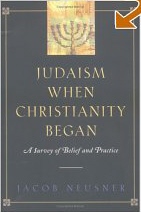
In my opinion, the title is misleading. The book is about the roots and
theology of Rabbinic Judaism, with little more than a nod in the direction of
Christianity. One suspects that “Christianity” made it into the title in hope of
greater sales. Nevertheless, the book is a useful, if difficult read. Neusner
needs an editor in the worst way.
What I found of special interest was the definition and explanation of the
Oral Law as a part of Torah and the Law of Moses. For the Jew, at least for Jews
of Rabbinic Judaism, the expressions, “the Law of Moses” and “Torah” include the
written law (the Scriptures) and the “Oral Law,” (what Jesus called, “The
tradition of the elders). Understanding this distinction is of great help in
understanding the issues raised in the Jerusalem Conference of Acts 15. I will
be including some in depth discussion of this in my next book on the law and the
covenants.
Recommended for a better understanding of what Judaism really
means as opposed to what a lot of Christians seem to think it means.
“Does God belong in the public arena of politics, business, law and
education?” Nancy Pearsey’s answer is an unequivocal yes. “In Total Truth, Nancy
Pearsey offers a razor-sharp analysis of the public/private split, explaining
how it hamstrings our efforts at both personal and cultural renewal.”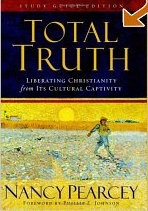
This is one of the more important books I have read in recent months. I was
particularly impressed with the observation that Christians have actually
cooperated in their own marginalization. If you don’t understand what is meant
by a Christian worldview, this book will make the issue crystal clear. There is
also a very useful section on evolution and intelligent design. The book is
exhaustively and carefully documented, so you can trace down all the sources for
yourself.
I strongly recommend this book. The last chapters did not really speak to me,
but the rest of the book is a strong contribution
I got this book because I was trying to sort out some background on the
Talmud, what it is, when it came to be. The book has all the basics and then
some.
“If the Bible is the cornerstone of Judaism, then the Talmud is the central
pillar, soaring up from the foundations and supporting the entire spiritual and
intellectual edifice. In many ways, the Talmud is the most important book in
Jewish culture.”
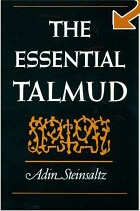
“The formal definition of the Talmud is the summary of oral law that evolved
after centuries of scholarly effort by sages who lived in Palestine and
Babylonia until the beginning of the Middle Ages. It has two main components:
the Mishnah, a book of halakhah (law) written in Hebrew; and the commentary on
the Mishnah, known as the Talmud (or Gemarah), in the limited sense of the word,
a summary of discussion and elucidation of the Mishnah written in Aramaic-Hebrew
jargon.”
Recommended for those interested in how and why Judaism and Christianity part
company.
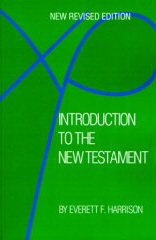
Harrison is an old timer, a professor at Fuller's Seminary. My edition dates
from 1971, and he had been teaching for 25 years then. There is later edition in
paperback. In these days when the origin and transmission of the New Testament
is being called into question, people should know that there is a different view
from the Da Vinci Code and related squirrel cages. I am considering using
Harrison's book as a source for some new radio programs introducing the New
Testament.
This book is recommended for the serious student who wants a scholarly view
of the New Testament that doesn't chase the kind of rabbits that various
scholars havemore recently been after -- to get published?
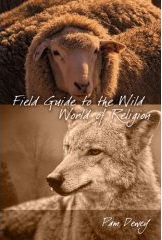
I find this book, and the author's
website, an invaluable aid in explaining
questions about various religious sects. People commonly ask me what I think
about this or that religious sect, and this gives me an objective source of
information where I can send them. Most of the stuff you read from self-styled
cult watchers is more than a little biased. What the author does here is
describe the people objectively, and often in their own words.
Book Description from Amazon:
The American religious scene in 1955 was a very tame and predictable
world. It matched the tame, predictable world of women's clothing, where
most women going out shopping wore a dress with coordinating gloves, hat
and shoes. And it matched the tame, predictable world of children's
toys, where almost every young girl yearned for a baby doll that said
Ma-Ma and almost every boy needed a coonskin cap. Choices of fashions,
toys, preachers and churches were limited and domesticated.
Fifty years later, the tame, predictable world of 1950s fashions and
toys is long gone. Women go shopping in everything from sweatshirts and
jeans to tube tops and short shorts. And both boys and girls want the
latest Sponge Bob Square Pants video game. The same kind of
transformation has gone on in the world of religion. It is no longer
tame and predictable either.
Welcome to the Wild World of Religion of the 21st Century. Explore
its habitats, identify some of the inhabitants, and learn about their
characteristics and customs in this Field Guide.
The opening section of the book provides an overview of some of the
factors that have taken us from the relatively Tame World of Religion in
1955 to the Wild World out there now in 2005. This section ends with a
chapter outlining seven trends the author finds particularly troubling.
The longest section of the book contains two encyclopedia-style
listings:
The Religious Lingo Lexicon cuts through the jargon of the Wild World
for the reader, providing concise explanations of over 100 specialized
terms, from Preterism to Petra and from Hermeneutics to Holy Ghost Glue.
The Who's Who Digest of the Wild World of Religion features brief
biographical sketches of over 120 of the most influential movers and
shakers of the American Religious scene, past and present. Meet everyone
from Joseph Smith and Ellen G. White of the nineteenth century to Benny
Hinn and Marilyn Hickey of the twenty-first century.
Also included are chapters on identifying the characteristics of
groups and teachers which may be dangerous to the spiritual health of
followers because they use deceptive or abusive methods to attract and
keep followers; overviews of four of the most influential religious
movements in recent decades; and an extensive bibliography of books and
websites for further research.
|
From his weekly devotional column, seen regularly on borntowin.net, author
Lenny Cacchio has assembled some of his favorite essays into a new book of
weekly readings. You will appreciate Lenny's insightful and humorous writings
that affect our lives. To receive a copy, just request it from the address
below. If you would be willing to contribute to the church's evangelism efforts,
a contribution of $10 per copy would be appreciated. Contact the publishers at:
Church of God, Kansas City
C/O Lenny Cacchio
705 NE Bryant Drive
Lee's Summit, MO 64086

Simply Speaking,
How to communicate your ideas with style, substance and Clarity,
By Peggy Noonan.
I thoroughly enjoyed this book. It is a remarkably helpful book for someone
who hopes to become an effective communicator. It is written more for the
inexperienced speaker, but even old dogs like me can learn a few new tricks. The
book is more than a how-to book, and contains a lot of stories and anecdotes
from people she has known and worked with. It is just an enjoyable read,
wherever you are on the scale of communicators.
She starts off with "Advice for people who never wrote a speech or pretty
much anything else." Then she proceeds to beat the drum for simplicity and
directness. There are helpful suggestions for everything from toasts to tributes
to eulogies.
I strongly recommend the book for everyone. It is a good, enlightening read.
Steering Through Chaos,
Vice and Virtue in an Age of Moral Confusion" by Os Guinness

I was a little frustrated at first, when I opened Os Guiness’ book, "Steering
Through Chaos." I was expecting something rather different from the title. It
looked like just another book on the seven deadly sins. But it turned out to be
a fascinating read. What the author has done is to contrast the seven deadly
sins with the virtue that defeats it. It is in the virtues that the course to
steer is laid down.
But there was more than that to the book. The author has pulled together long
and short quotations from other authors ranging from Moliere to C.S. Lewis to
Saint Augustine to illustrate the major ideas. In the process, he is likely to
introduce you to some new authors you will want to read more of. For me, that
came in an introduction to Henry Fairlie. There was one paragraph that I thought
spoke volumes about where we are going astray in our generation. On envy, he
wrote this:
"The legend of our times, it has been suggested, might be "the
revenge of failure." That’s what envy has done for us. If we cannot
paint well we will destroy the cannons of painting and pass ourselves
off as painters. If we will not take the trouble to write poetry, we
will destroy the rules of prosody and pass ourselves off as poets. If
we’re not inclined to the rigors of an academic discipline, we will
destroy the standards of that discipline and pass ourselves off as
graduates. If we cannot or will not read, we will say that "linear
thought" is now irrelevant and so dispense with reading. If we cannot
make music, we will simply make a noise and persuade others that it is
music. If we can do nothing at all, why! We will strum a guitar all day
and call it self expression. As long as no talent is required, no
apprenticeship to a skill, everyone can do it, and we are all magically
made equal. Envy has at least momentarily been appeased and failure has
had its revenge.
It always astonishes me that Rap is included in music awards. It is the
ultimate statement of mediocrity. Excellence is being killed off by envy.
Fairlie went on to say:
"Envy grows naturally" said Aristotle in relationship between equals.
"We live in a society that perhaps as much as any other has pitted
equals against equals," writes William F. May but I think he misstates
his point. The United States and other western societies are not pitting
equals against equals but unequals against unequals as if they are
equals. This is a distortion of the idea of equality and it is this
distortion as much as anything else that has enabled the enemies of
genuine equality to move on the offensive."
"The idea that we are equal has been perverted into the idea that we
are identical; and when we then find that we cannot do and experience
and enjoy all the things that others do and experience and enjoy, we
take our revenge and deny that they were worth doing and experiencing
and enjoying in the first place. What we are unable to achieve, we will
bring low. What requires talent and training and hard work, we will show
can be accomplished without them." Henry Fairlie
"The same can be asked of much of the revenge that envy is taking
today to conceal the sense of failure . . . We are giving the name of
art to what is not art, of poetry to what is not poetry, of education to
what is not education, of achievement to what is not achievement, of
morality to what is not morality, and of love to what is not love. We
trivialize our concepts of them all to make them seem as if we may all
attain them. None of us is wholly exempt from the corruption. We find no
place for the unique, for what is rare and cannot be imitated, since we
would then not be able to achieve it. We seem no longer able to admire,
respect or be grateful for what is nobler or lovelier or greater than
ourselves. We must pull down - or put down - what is exceptional."
Do yourself a favor and include this valuable book on your reading list.
[This is the answer to the question.]
Ronald L. Dart.
Copyright © 2006. All rights reserved.
Revised: 02/28/10.
|
 Also bear in mind that recommending a book does not mean we endorse everything
in the book.
Also bear in mind that recommending a book does not mean we endorse everything
in the book.






